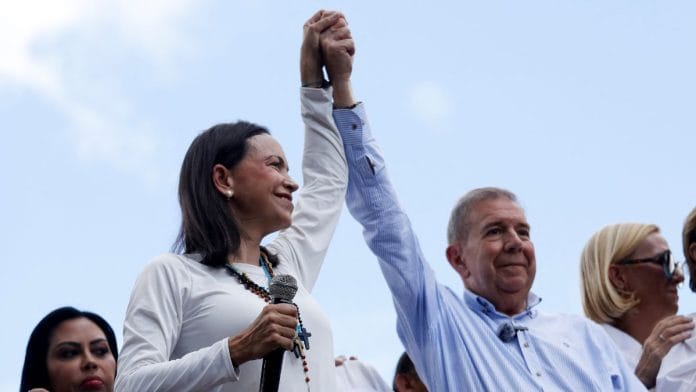New Delhi: The US Thursday recognised Venezuelan opposition leader Edmundo González Urrutia as the winner of the country’s presidential elections in a bid to corner incumbent Nicolás Maduro.
The announcement by US Secretary of State Antony Blinken puts the spotlight on the Venezuelan electoral authority, which had declared Maduro — who has had a $15 million bounty on him from the US state department since 2020 — the victor without releasing details of the vote count.
Blinken congratulated González on his campaign. “Now is the time for the Venezuelan parties to begin discussions on a respectful, peaceful transition in accordance with Venezuelan electoral law and the wishes of the Venezuelan people,” he said in a statement.
He added: “Unfortunately, the processing of those votes and the announcement of results by the Maduro-controlled National Electoral Council (CNE) were deeply flawed, yielding an announced outcome that does not represent the will of the Venezuelan people.The CNE’s rapid declaration of Nicolás Maduro as the winner of the presidential election came with no supporting evidence.”
Maduro, however, was quick to respond to this, asking the US “to keep its nose out of Venezuela,” AP reported.
The disputed results have triggered protests across the country, which has seen a brutal crackdown by security forces and pro-Maduro gangs, which killed at least 17 people and led to the arrests of a further 750, as reported by The New York Times.
The González camp, however, has said that it has evidence of more than 80 percent of tally sheets received directly from various polling stations, indicating that the opposition candidate had received the greatest number of votes in the elections held Sunday.
Blinken’s statement made no mention of recognising Gonález as the president of Venezuela, while it called for the peaceful transfer of power.
According to the CNE, Maduro won 51 percent of the votes, while González won 44 percent. The results were announced Monday, but the CNE has not made public any of the individual tally sheets to prove this fact.
Hours before Blinken’s statement, Maduro took to social media to state that he was willing to open a dialogue with the US if Washington D.C. would respect Caracas’ “sovereignty” and withhold “threats”. The incumbent president added that the negotiations could be backgrounded by the promises made by the US in Qatar last year, saying it would ease sanctions if elections were held in the country.
The Qatar deal led to hopes of Venezuela returning to the global oil trade, especially as it is home to some of the world’s largest oil reserves, and was one of the main sources of crude for India, until the sanctions placed by the US in 2017 and 2019, as reported by ThePrint earlier.
Russia, China support Maduro
The election results declaring Maduro as victor have found support among a few global powers including Russia, China and Namibia, while allies such as Cuba, Nicaragua and Bolivia have also welcomed the results.
While the US is the largest country to announce that it has recognised González as the winner, the UK and several of Venezuela’s Latin American neighbours, including Argentina, Chile, Peru, Colombia and Costa Rica, have all rejected the results.
The European Union (EU), was unable to put out a joint statement on the results, after this was blocked by Hungary, as reported by Politico Europe. Josep Borrell, the high representative of the EU for foreign affairs and security policy , put out a statement in his own name urging greater transparency in the results and calling for independent verification of the final tallies.
Mexico, Brazil and Colombia — three countries in the region governed by leftists — have all urged the CNE to publicly release data broken down by polling stations. The three countries have maintained ties with the authoritarian Maduro. who has been in power for over a decade.
The Carter Center, which observed the election, announced that the polls “did not meet international standards and cannot be considered democratic”, in a statement published Tuesday.
Guaidó part 2?
In a press conference Wednesday, as reported by The Washington Post, Maduro called González as “Juan Guaidó part 2” — a reference to the former Venezuelan opposition leader who in 2019 had attempted an uprising against Maduro.
In 2018, Maduro held a presidential election, which was rejected by a number of countries. Guaidó, the then president of the National Assembly — Venezuela’s legislature — declared himself as the leader of the country after invoking constitutional provisions that allowed his position to take over executive power.
Then US president Donald Trump recognised Guaidó as the president of Venezuela. In April 2019, Guaidó declared an uprising against Maduro, inviting civilians and the military to join him, but this plot failed.
Maduro has been the leader of the country since 2013, after the previous president, Hugo Chávez, handpicked him as his successor. Chávez, who had led the country since 1999, had seen it become one of the fastest growing economies in the region due to the boom in oil prices that decade.
After Chávez ‘s death in 2013, Maduro had to deal with a global slump in oil prices, which impacted the economy, leading to serious economic difficulties including high inflation.
In the decade since the start of his rule, roughly 7 million Venezuelans — a quarter of the country’s population — have fled the country, heading primarily to the US as Venezuela’s economy cratered.
(Edited by Tikli Basu)
Also read: Amid dispute over Venezuela presidential poll results, candidates told to present their vote tallies






